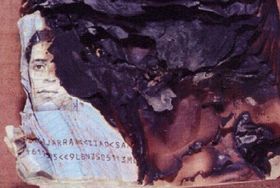Missing documents
(cover-up) | |
|---|---|
Error creating thumbnail: File missing | |
| Files do go missing, both accidentally and on purpose. This article reviews some of the common patterns. |
Documents do go missing, both accidentally and on purpose. Differentiating between the two can be hard in any individual case, but larger patterns are helpful in revealing the bigger picture.
Contents
Document destruction
- Full article: Destruction of evidence
- Full article: Destruction of evidence
Destruction of evidence has a long history within the CIA. For example, in 1973 outgoing CIA Director Richard Helms ordered the destruction of all documents relating to the MK Ultra programme.
CIA whistleblower John Stockwell reported that as CIA Director, George H. W. Bush used requests by US congress to facilitate his destruction of documents.[1] Bush is presumed to have ordered the destruction of all documents about his earlier CIA career, although at least 3 documents survived which later exposed him as a lifelong CIA operative.
By deep events
Deep events are used to destroy documents in apparently unrelated cases. The supreme example of this was 9-11. This provided a cover for the shutdown of many events which were problematic for the US deep state. Another example was the OKC bombing, which damaged the Murrah Building.
FOIA requests
- Full article: FOIA
- Full article: FOIA
The extreme informational asymmetry between those who request and those who fulfil FOIA requests mean that it can be hard to discern stonewalling by a pattern of repeated disingenuous claims of "no responsive documents".
The situation is improved for serial FOIA requesters. They not only have experience at phrasing such requests, but can cross-reference different responses. For example, the FBI's repeated claim of having no documents about Gerald MacGuire[2] was belied by the fact that his name was mentioned in documents revealed in response to a request about Smedley Butler.[3]
Repeating patterns
One recurring pattern is that reports compiled by junior, regional officials are passed up the chain of command only to vanish when they reach the national levels controlled by deep state groups.
SFO
The SFO stated in 2013 that it abandoned its investigations into the multi-billion dollar Al Yamamah arms deal due to losing 32,000 pages of data and 81 audio tapes.[4]
BBC
A BBC editor once stated that the BBC couldn't give more details on its premature announcement of the destruction of WTC7 due to having lost that tape.[5] Later they reportedly found it again but have not answered the question about their foreknowledge of WTC7's destruction.[6]
VIPaedophile
- Full article:
 VIPaedophile
VIPaedophile
- Full article:
Various VIPaedophile-related dossiers have been compiled by UK police but were later "lost" by Whitehall, senior police, the SFO or intelligence agencies.
CCTV
- Full article:
 CCTV
CCTV
- Full article:
CCTV provides an extra level of deniability, since by design, CCTV cameras provide no indication of whether they are functioning correctly, so missing footage can be blamed on technical problems. This is regularly used to account for missing CCTV footage of deep events, including the 7-7 bombings, OKC bombing, unlawful killing of Diana Spencer.
Occasionally, 3rd party footage is confiscated, such as on September 11th, 2001, when all known footage of the attack on the US Pentagon was quickly confiscated. As of December 2018, only a set of images from one low frame rate CCTV camera have been released.
Lost and Found ID syndrome
- Full article:
 Lost and Found ID
Lost and Found ID
- Full article:
In 2015 Russ Baker coined the phrase "Lost and Found ID syndrome", observing a regular pattern in deep events. Passports, he noted, tend to be conspicuous by their presence rather that their absence. [7] The deliberate creation of a misleading document trail is a converse of the deliberate destruction of real documents.
Internet censorship
- Full articles: Internet/Censorship, Streisand Effect
- Full articles: Internet/Censorship, Streisand Effect
Removal of documents from the internet is often technically difficult. Moreover it is risky due to the Streisand Effect, since unsuccessful attempts to remove documents can draw more attention to them.
References
- ↑ http://www.unwelcomeguests.net/656
- ↑ https://www.muckrock.com/foi/united-states-of-america-10/gerald-c-macguire-37609/
- ↑ https://cdn.muckrock.com/foia_files/2017/06/07/File_1_Section_1_Serial__1.pdf
- ↑ http://www.bbc.com/news/business-23622364
- ↑ http://www.bbc.co.uk/blogs/theeditors/2007/02/part_of_the_conspiracy.html
- ↑ http://www.bbc.co.uk/blogs/theeditors/2008/07/controversy_conspiracies_iii.html
- ↑ http://whowhatwhy.org/2015/02/01/lost-found-id-oddity-terror-cases-stupid-sinister/
